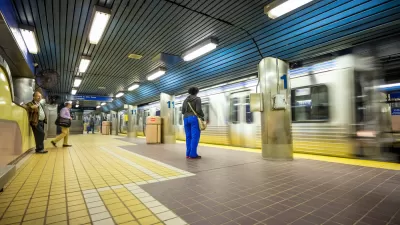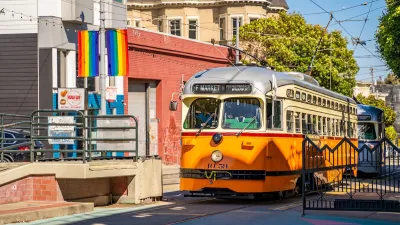A new survey from TransitCenter surveyed 11,846 Americans on their transit use, living environment, upbringing, and personal characteristics.
As reported on by Payton Chung earlier this week in Streetsblog USA, the new "survey found that Americans’ feelings towards transit and cities vary considerably by age, personal values, and whether transit provides a feasible travel option in their neighborhoods. Factors that don’t have much of an effect on transit use include having children at home, education level, having very high incomes, and the region of the country people inhabit."
Seconding previous research, the TransitCenter survey found that factors like living in transit-rich environments, and being employed or in school influence the likelihood of transit ridership, among other things. In addition, the TransitCenter survey found that transit riders "are likely to have grown up in neighborhoods with convenient transit, to be open to new things and experiences, and to want to remain productive while traveling. These motivations are almost as strong as more basic motivations, like relying on transit because no other options are available."
Moreover, the survey found that riders did not differentiate between bus, commuter train, or rail lines when making their mode decision. As Chung wrote, "it’s how people view the urban environment, more than the transportation mode itself, that leads them to ride transit or drive cars."
FULL STORY: Why Transit Agencies Should Woo “Bohemian Boomers” and “Metro Moms”

Study: Maui’s Plan to Convert Vacation Rentals to Long-Term Housing Could Cause Nearly $1 Billion Economic Loss
The plan would reduce visitor accommodation by 25,% resulting in 1,900 jobs lost.

North Texas Transit Leaders Tout Benefits of TOD for Growing Region
At a summit focused on transit-oriented development, policymakers discussed how North Texas’ expanded light rail system can serve as a tool for economic growth.

Why Should We Subsidize Public Transportation?
Many public transit agencies face financial stress due to rising costs, declining fare revenue, and declining subsidies. Transit advocates must provide a strong business case for increasing public transit funding.

How to Make US Trains Faster
Changes to boarding platforms and a switch to electric trains could improve U.S. passenger rail service without the added cost of high-speed rail.

Columbia’s Revitalized ‘Loop’ Is a Hub for Local Entrepreneurs
A focus on small businesses is helping a commercial corridor in Columbia, Missouri thrive.

Invasive Insect Threatens Minnesota’s Ash Forests
The Emerald Ash Borer is a rapidly spreading invasive pest threatening Minnesota’s ash trees, and homeowners are encouraged to plant diverse replacement species, avoid moving ash firewood, and monitor for signs of infestation.
Urban Design for Planners 1: Software Tools
This six-course series explores essential urban design concepts using open source software and equips planners with the tools they need to participate fully in the urban design process.
Planning for Universal Design
Learn the tools for implementing Universal Design in planning regulations.
City of Santa Clarita
Ascent Environmental
Institute for Housing and Urban Development Studies (IHS)
City of Grandview
Harvard GSD Executive Education
Toledo-Lucas County Plan Commissions
Salt Lake City
NYU Wagner Graduate School of Public Service





























